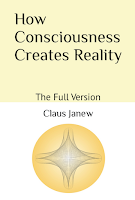Can we trace back consciousness, reality, awareness, and free will to a single basic structure without giving up any of them? This dialogue founds consciousness and freedom of choice on the basis of a new reality concept that also includes the infinite as far as we understand it. Just the simplest distinction contains consciousness. It is not static, but a constant alternation of perspectives. From its entirety and movement, however, there arises a freedom of choice being more than reinterpreted necessity and unpredictability. The unity and openness of the infinite enables the individual to be creative while this creativity directly and indirectly enters into all other individuals without impeding them.
Great Read. Thank you for putting your work out into a conscious space
for all. Much appreciated.
Marcel P. Londt, PhD, South Africa
Read online (90%)
Order the Book
Order the Book
Also in this book:
The Reality of Free Will
The uniqueness of each standpoint, each point of effect, can only be "overcome" by the standpoint changing to other standpoints and returning. In such alternation, which can also appear as constant change, lies the unity of the world. The wholeness of an alternation, however, is a structure of consciousness due to the special relationship between the circumscribing periphery and the infinitesimal center. This process structure unites determinacy and indeterminacy also totally in every place. Therefore, everywhere we are dealing with forms of consciousness with more or less freedom of choice and an increasingly unknown depth. We live in a world of choosing consciousness, or rather awareness. In this respect, our environment expresses a deep truth about ourselves.
I am impressed by the comprehensiveness of your interdisciplinary
approach. There are some major philosophical concepts which you weave
very well into a necessary system of reality: potential, the one and the
many, alternation, constant change, the reality and uniqueness of
oneiric experience and the whole, interdependence, infinity, the mandate
of opposites and many more. The combination of these ideas cannot be
attributed solely to any other of the established classical and modern
thinkers of whom I am aware. I thank you for your enlightenment.
E W Ralph, UK





